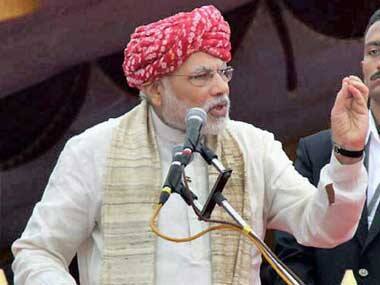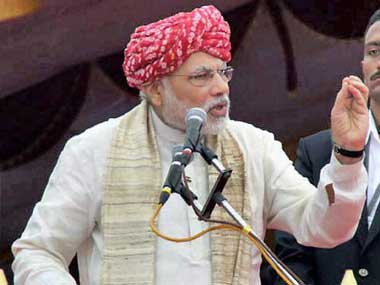Gujarat Chief Minister and BJP campaign chief Narendra Modi’s choice of Independence Day to openly pitch himself as the man to replace Prime Minister Manmohan Singh in the upcoming general election has triggered a political debate. What does Modi’s latest display of symbolism mean? What was the big idea behind Modi’s Bhuj performance? And did it succeed? To understand the intent and impact of Modi’s Independence Day moment, _Firstpos_t spoke to Nilanjan Mukhopadhyay, author of the recently published biography Narendra Modi: The Man, The Times. ( Read an earlier interview with the author on the political impact on Modi of the Ishrat Jahan case here ) [caption id=“attachment_1038903” align=“alignleft” width=“380”]  Gujarat Chief Minister Narendra Modi. PTI[/caption] Excerpts from the interview: Your first impressions of Modi’s performance yesterday. It is a continuation of Modi’s strategy of challenging the existing limits of political morality in this country. What Advani said about Independence Day not being the appropriate occasion is a reflection of the basic framework of existing political morality which has come to be accepted in a consensual manner from the time India became independent. Advani’s statement is also indicative of the fact that he still does not want to completely destroy the existing boundaries of political behaviour. Here Modi is trying to challenge and test the boundaries. It is not just the question of the political ideology that he wants to transform, he is also trying to change the basic political morality. In his framework, there are no limits of decency. That is the way he plays his game. It is a no-holds-barred game. Next 15 August he would want to be there at Red Fort. (In the speech he made yesterday) he was not talking to the people of Gujarat. He was talking to the entire country, in Hindi. It was very similar to the speech he gave after winning in December 2012. As I have been arguing, Modi is trying to completely break away from the existing beliefs and norms of behaviour of political leadership. He is making people uncomfortable. Whether that is good or bad is a different matter. Was the decision to take on the PM on Independence Day his most audacious act yet in that direction? This is the first definite indication that Modi is trying to test the limits of existing political morality and behaviour in this country. Was that the intent of yesterday’s speech or an intended consequence? This was done deliberately. He is doing it because he wants to test the limits. He had declared it two days earlier. He was clear what he was going to do. He also had to recover from what, I believe, was a damp squib in Hyderabad. I don’t think Modi would be happy with his own performance in Hyderabad. I don’t think he is still comfortable with addressing the issues he had to address in Hyderabad – the issue of smaller states, the issue of Pakistan. He is not very clear on these issues. In yesterdays’ speech, there was no substance. It was sheer rhetoric, it was sheer populism. This is a territory that he is most comfortable with - a pure demagogue who spews nothing but pure demagoguery. He is by far the most charismatic and probably a leader with the best oratorical skills in the country at the moment and he wants to make the most of it. I would say yesterday’s speech was dangerously successful. He has successful in what he was trying to do. Why do you think he succeeded? Modi has to do two things. He has to make sure that those who support him do not go away and, two, very steadily he has to keep adding to these numbers. Based on the estimate of how his supporters would have loved it and how it would have helped in getting some more supporters on to his side, I think he succeeded yesterday. He is selling a dream. It is very easy to sell dreams because you don’t have to justify how you will achieve that dream. Manmohan Singh’s problem is that the UPA no longer can sell dreams, they have been running the government since 2004. A large number of people also believe that the dream they were sold in 2004 and 2009 has ended being a nightmare. A dream-seller is better placed. Especially on the occasion of Independence Day, which has always been a listing of achievements, Manmohan Singh or any PM for that matter realises that in a country like India, expectations will always outweigh what has been delivered. In Gujarat, Modi has succeeded because he has been able to hide the expectations. There is a huge level of expectation from the underprivileged, the Dalits, the tribals, the minorities. How do you think yesterday’s move has gone down with his own party? Did they know he was going to so openly pitch himself as the prime ministerial candidate? They wouldn’t have known the extent to which he would go. He doesn’t disclose his plan. But Advani’s reaction is indicative. Deep down there is a significant section within the top leadership of the BJP which is comfortable with the basic framework of Indian politics. All non-Congress PMs, including Vajpayee, have not gone out and smashed the basic political structures and political values, that is how I look at it. That is why in March, Advani was still arguing that BJP needs to have a charter of commitment to the minorities and that the party needs to evolve a new relationship with the minorities. Modi does not say all that. He says minorities are welcome, but India First, One India, one language, one culture. His is a completely singular approach in a pluralistic country like India. Were there any departures in yesterday’s speech? There were no departures. He has pursued the same path. It is important for Modi to play on his turf. That is where he plays best. This is his home territory. The lingo that he uses, he doesn’t want to use very complicated phrases. It is pure rhetoric. He wants to maintain the same tone and tenor. He is beginning to talk about India’s policies on Pakistan and China. I don’t think if someone were to ask him how he would deal with Pakistan or China, if he were to become PM, he would have an answer. Other than speaking in very broad general terms, he wouldn’t say anything specific. That is not to say that foreign policy cannot be evolved in the course of an election campaign. Having known him, I don’t think he has clarity on that yet. He sees himself more as a service provider and not as visionary. What did you make of his take on the Food Security Bill? This is a battle within the party. He wants to emerge not just as a vote-catcher but also as someone who determines the policy of the party. He is basically trying to convey the message that the handful of people in Parliament who can’t even win a Lok Sabha seat can’t be the ones who determine the party’s position on the Food Security Bill. He was obviously not consulted on the Food Security Bill. Reporters would tell you that Modi was not consulted prior to Sushma Swaraj or Rajnath Singh giving indications that they would support the Food Security Bill with a few minor modifications. Modi wants his voice to be heard at every level, he doesn’t just want to be the cosmetic head of the campaign committee. He is sending out the message that though he may not have been declared the PM candidate yet, he will determine strategy and policy of the party. This is his message both to his supporters and adversaries in the party.
Author Nilanjan Mukhopadhyay said that the Gujarat chief minister is selling a dream while Prime Minister Manmohan Singh is not in a position to do so.
Advertisement
End of Article


)
)
)
)
)
)
)
)
)



